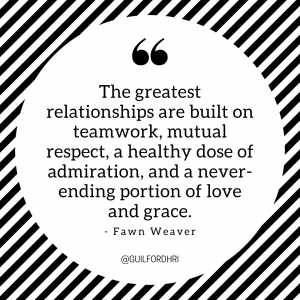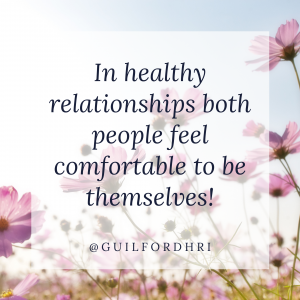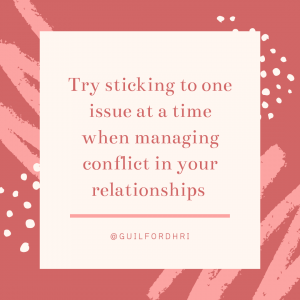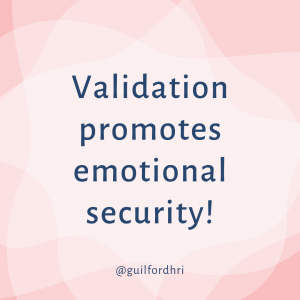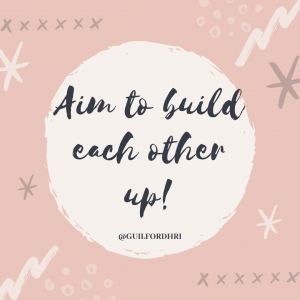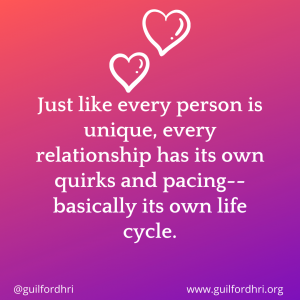
As a teen, you may be starting to date for the first time in your life, or maybe you’ve been in romantic relationships before, but now you’re starting to build more serious relationships. You may be feeling excited, hopeful, and maybe even a little nervous or scared. It’s normal to have lots of mixed emotions during this new and exciting time in your life! When you start dating, it’s important to know what to look for in a partner and a relationship, as well as what you can do to make sure that your relationship is as happy, healthy, and safe as possible. HRI has created 5 tips to help you build a healthy teen relationship, as you start dating for the first time or start your first serious relationship!
1. Aim for Mutual Respect
Healthy relationships are built on mutual respect! Mutual respect means that you and your partner respect each other for who you are and honor one another’s boundaries. It also means that you treat each other with kindness and compassion through your actions and words. When you speak to your partner, do so with kind and respectful words, even if you are in an argument. When you are mindful about how you treat one another, you will be able to build a healthier and stronger relationship over time!
2. Aim for fairness & equality
Healthy relationships involve give and take from both people. Both people should feel supported, valued, and heard, and neither partner should have more power or control than the other.
It’s important for you and your partner to strive for fairness and equality in your relationship. This may look like taking turns choosing what movie to watch or where to go for dinner. It also looks like hanging out with both partners’ friends and families, instead of spending all of your time with one person’s friends/family. When you focus on promoting fairness and equality in your relationship, you and your partner will have a strong foundation moving forward!
3. Establish honesty & trust
Honesty and trust go hand in hand in healthy relationships. When you and your partner are open and honest with one another, your trust in one another will grow. Trusting each other means that you give your partner the benefit of the doubt and believe that they have your best interests at heart. Trust looks like giving one another space to celebrate your individuality and independence and to spend time with other important people in your lives. Trust also looks like believing that your partner is being truthful with you and refraining from checking up on them or making assumptions when spending time apart.
Remember, it takes time to build trust, so be intentional about taking steps to trust and be trustworthy in your relationship.
4. Practice healthy communication
Healthy communication is key to a healthy relationship! In healthy relationships both people feel safe to express their thoughts and feelings openly and honestly without fear of how the other person will react. Both people also try their best to use active listening when their significant other is talking. This means listening with the intention of understanding, asking clarifying questions if you don’t understand something, and refraining from thinking of your next point or a comeback when the other person is talking. Using active listening builds understanding and connection, and can help couples avoid miscommunication and misunderstandings.
Another integral part of healthy communication is being able to resolve conflict in a healthy way. When we’re feeling angry or upset with our significant other, it can be really easy to lose our cool and yell or lash out. However, it’s important to try our best to keep from doing this, because it is hurtful to the other person and can damage our relationships. Recognize when you’re feeling upset and are having a hard time regulating your emotions. Instead of letting your emotions take control of your actions, pause and tell your partner that you need to take a break before talking about an issue further. This will allow you to calm down and revisit the topic when you are calmer and better able to communicate your thoughts and feelings in a healthy way.
5. Support one another, while leaving room for independence & individuality
In healthy relationships, couples support one another, while also giving each other space to be independent. This means being there for each other to celebrate successes and provide support during difficult moments, as well as supporting one another’s right to time alone, independence, and individual relationships with friends and families.
Healthy couples support each other’s passions and dreams and give one another time and space to pursue individual interests and hobbies. It’s important to maintain your individuality within your relationship!
For more information about building healthy relationships as a teen, check out our Healthy Relationships for Teens blog series!

